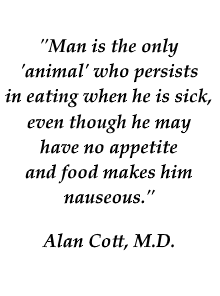What is Fasting Really?
(It's more than just not eating.)
Fasting is a natural practice done to promote healing, to fortify the body and soul, not to tear them down. In the animal kingdom it happens on an instinctual level. While we humans usually have to make a greater effort, it is still a natural biological action. Eating 24/7 is not natural. Taking a break from food allows for a rebalancing within the body, and within our psyche, affecting also our sense of connection to the world of spirit.
So what are all the different terms?

In its simplest form, fasting is abstaining from all food and drink except water. (Although there is a purer form yet, called "dry fasting".) This is the older definition for fasting and the meaning implied by the ancient teachers, like Hippocrates when he prescribed fasting for health. (See History of Fasting.)
In our modern-day world, the definition has become more complicated because we often include modified fasting in the definition. Modified fasting allows the addition of other items to the diet besides water, like juice or fruit or other simple, wholesome foods. Technically, these would actually be "diets" and are sometimes called "cleansing diets" or "detox diets", to emphasize the cleansing aspects, and "fasting diets".
What they all have in common is that they abstain from select food or drink for a specified period of time, with an intent toward either increased health or increased spiritual awareness, or both.
On this site, we use the term fasting for the more intense methods where food and nutrition are severely restricted, as in none at all (water fasting) or very limited (as in the Master Cleanse or fruit fasting). These methods are a drastic change from normal eating patterns. We use the term "cleansing diets" for those methods which are milder in nature and allow for a greater diversity and quantity of food. (See Types of Fasting for more information on the different methods.)
As you learn more about fasting, you'll discover there is every shade of gray between fasting and a cleansing diet and a "regular" diet.
What healthy fasting is not
Fasting for the purpose of starvation (by healthy individuals) or for political reform is obviously not the healthful therapeutic fasting we're promoting here. There are those who use fasting, the denial of food and/or water, to do themselves bodily harm. One can fast until bodily tissue is irreparably destroyed and until death by starvation occurs. Sometimes this is purposeful and sometimes, as in the case of eating disorders, it is unintentional.
Even without such extreme intentions, we can do our bodies a disservice if we are not careful about the process. There are those who have come out of a fast feeling worse than when they started. In these rare cases, invariably some signal of distress by the body was ignored. We can't let our goals and expectations for the fasting experience override our connection to health and well being.
To quote Herbert Shelton, a proponent of water fasting, from his book, Fasting Can Save Your Life:
"One must differentiate between fasting and starving. To fast is to abstain from food while one possesses adequate reserves to nourish his vital tissues; to starve is to abstain from food after his reserves have been exhausted so that vital tissues are sacrificed. We are not left unwarned as to when the reserves are nearing exhaustion. Hunger returns with an intensity that drives one to seek food, although during the fast proper, there is no desire for food. This differentiation between fasting and starving should help to dispel any notion that starvation sets in with the omission of the first meal."
Since there are certain health conditions that preclude fasting, be sure to read the pages Who Can Fast and Precautions to Fasting before beginning a fast.
Physiological effect of fasting
When fasting, our bodies' change gears to that of cleansing and healing. Energy, in the form of glucose is still necessary to proper functioning. Ketosis is a complex metabolic process whereby some bodily functions will switch to using ketones for fuel instead of glucose.
This process can protect us during times of famine, which is a long-term event, but serves us well in the short term, during times of illness or stress or any other imbalance for which abstinence from food is called for or accidentally occurs. The body will signal when its reserves are no longer capable of supporting the body's energy needs.
The purpose of fasting is many-fold
There are many benefits to fasting, as it has such widespread effects on our being as a whole. Not just our physical bodies are affected, but also our mental and emotional states, as well as our feeling of spiritual connection.
Physically, fasting provides a natural resting period for our bodies, during which stored waste materials can be more easily eliminated and greater healing can occur. There are many common conditions that have consistently shown improvement in fasting individuals. And after the initial detox discomfort passes, we experience a greater level of energy and enthusiasm toward life.
Spiritually, fasting has been or is a part of every major religion. The clarity and insights gained through fasting lead to greater faith and understanding. Prayer becomes more meaningful. Meditation becomes more fulfilling.
There are a variety of approaches to healthy fasting
It's not just water fasting anymore. There are lots of options for us now; juice fasting, rice fasting, and fruit fasting are some of the most popular (see Types of Fasting page). And the length of time to fast is not set in stone, you can go whatever length of time feels appropriate to you, even less than a day.
If you're looking specifically to do a fast for detox or cleansing, any fast or cleansing diet will deliver that--it's just a matter of how quickly the detox happens and how much discomfort you may feel in the process.
Methods of fasting are as varied as we are. Just as each of us is unique, so the perfect method to meet our individual needs will be unique. Listen to your inner knowing in deciding what method to employ and feel free to alter any given style as you see fit.
For general information about getting started with fasting, read Information on Fasting, which is geared toward the beginner, and provides a good overview of a one-day fast.
Return to top
return from What is Fasting? to All About Fasting home page
Related Pages
Liquid Fasting lists some of the options
for doing a liquid-only fast, including broth and milk.Ketosis Explains the muscle-sparing process of the body during different types of fasts.
Fruit Fast Details how to do a 1-3 day fast with apples.
The real benefits of Fasting for Weight Loss, affecting deep and lasting changes in our lives.
Emotional Benefits of Fasting offers insight on the healing effects fasting has on our emotional and mental patterns.
Recent Posts
-
Valter Longo and the Longevity Diet
Valter Longo's Longevity Diet, which is a fasting mimicking diet, is showing great promise as a prescribed therapy. If you haven't heard of Valter Longo, check out his newly launched website to follow… -
Fasting Overview for Beginners
Information on fasting especially geared toward the beginner. Important guidelines on fasting including the contraindications and how to do a simple one-day fast. -
Meat vs. Vegan | AllAboutFasting
Confusion seems to arise as to whether this site promotes meat-eating or veganism. Let's set the record straight and talk about ideal diets. Ideal for whom? Each of us individually.
